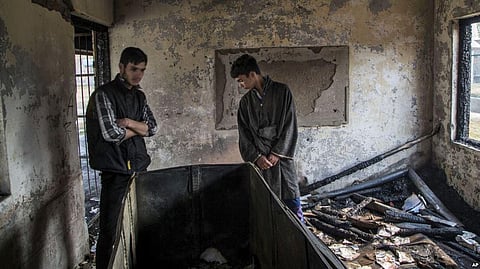More than 24 School Burnings by unidentified Arsonists Cause Consternation in Indian Kashmir
New Delhi, November 3, 2016: More than two dozen schools have been burned in Indian Kashmir by unidentified arsonists during the last two months as education becomes a new flashpoint in the unrest that has gripped the region since July.
It is first time that schools have been targeted on this scale in the restive Himalayan valley where Islamic militants usually strike at military or police targets. Most schools have also remained closed for nearly four months due to a shutdown call given by separatist leaders in the state.
NewsGram brings to you latest new stories in India.
After three schools were set ablaze last weekend, the Jammu and Kashmir High Court called on the state government to ensure their protection, "unmask the enemies of education" and deal with them with an "iron hand."
But there appear to be no clear answers as to who is behind the spate of destruction of school buildings that has taken place across 10 districts. Some schools have been completely gutted, while others are partially burnt.
Police say they have made some arrests, but have not announced who is to blame.
Observers say the burning of the institutions accelerated after the state government made attempts to reopen schools, and announced that examinations would be held on schedule despite their prolonged shutdown.
Schools were initially closed due to a curfew imposed after the killing of a local militant leader, Burhan Wani, triggered a wave of violent anti-India protests in which about 90 people have died. Later separatist leaders included educational institutions in weekly strike instructions they have been issuing.
FILE – Indian security personnel inspect a house allegedly damaged by from gunfire from the Pakistan side of the border, at a residential area near the international border at Bidipur, in Ranbir Singh Pura, India, Oct. 22, 2016. VOA
Top state officials have slammed the separatists, saying they want to raise a generation of uneducated youth who can be used to pelt security forces with stones.
"That is the intention. To keep them away from schools and have cannon fodder ready," Kashmir education minister, Naeem Akhtar told VOA. "They (separatists) have allowed businesses to work partially, the private trade, everything is going on. It is about denying education to students," he said.
Go to NewsGram and check out news related to political current issues.
Condemning the burning of schools, Kashmir's main coalition of separatist groups, the All Parties Huriyat Conference, has shot back saying that the school burnings are part of a "well-planned strategy to malign the ongoing movement and paint it as violence and anarchy."
Amid the accusations and counter accusations, observers point out that the victims are the tens of thousands of students in the valley.
For the government, reopening schools would be a signal that normalcy has returned to Kashmir, which is suffering its most prolonged phase of unrest since a violent separatist insurgency abated 15 years ago. Top separatist leader Syed Ali Shah Geelani has said schools will only be allowed to open once the government concedes to their demand to release all those detained during the protests.
"It is just so sad that all issues in Kashmir begin to become about propaganda or rhetoric when these are very important daily life issues. It is between ridiculous and tragic," said Radha Kumar, a policy analyst who was a government interlocutor in Kashmir when protests gripped the region six years ago.
FILE – Masked Kashmiri protesters shout pro-freedom slogans during a protest in Srinagar, Indian-controlled Kashmir, Oct. 14, 2016. VOA
Both the police and state government have appealed to the local community for help in protecting the schools, saying it is impossible to provide security to over 12,000 buildings spread over the mountainous region.
As the arsons triggers a wave of popular anger, Education Minister Akhtar sees a ray of hope. "The silver lining is that society has risen like one man. In fact the entire education has become a subject of debate. That is what I see as a silver lining in otherwise a very dark horizon," he said.
In a region where there is widespread alienation and anger with security forces and the state government, the burning down of schools has caused consternation.
Kumar said, at least where the issue of education is concerned, public opinion is with the government. "What the government does have in their favor is that there is now a large public outcry against the burning of schools," she said. "That should help them a great deal if they show a serious commitment to reopening the schools and providing education."
Look for latest news from India in NewsGram.
South Asia Director at Human Rights Watch, Meenakshi Ganguly, said the situation in Kashmir since July has been very difficult for young students. "Burning of schools is a serious concern. Attacks upon schools denies the child the right to an education," he said.
Divided between India and Pakistan, Kashmir was wracked with a violent separatist insurgency in the 1990's, but the situation had greatly improved in the last 15 years, although there were brief phases of unrest. The present turmoil however has raised fears that it is slipping back into a conflict phase. (VOA)


